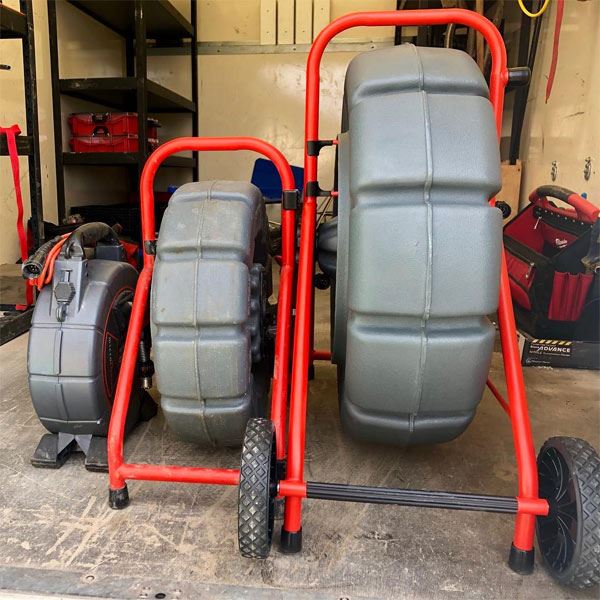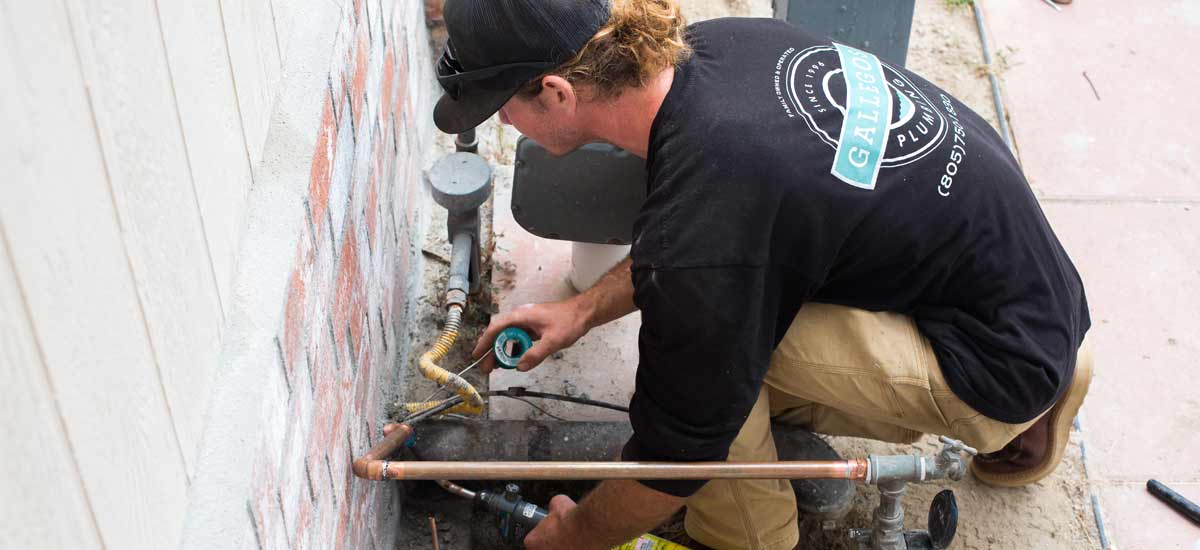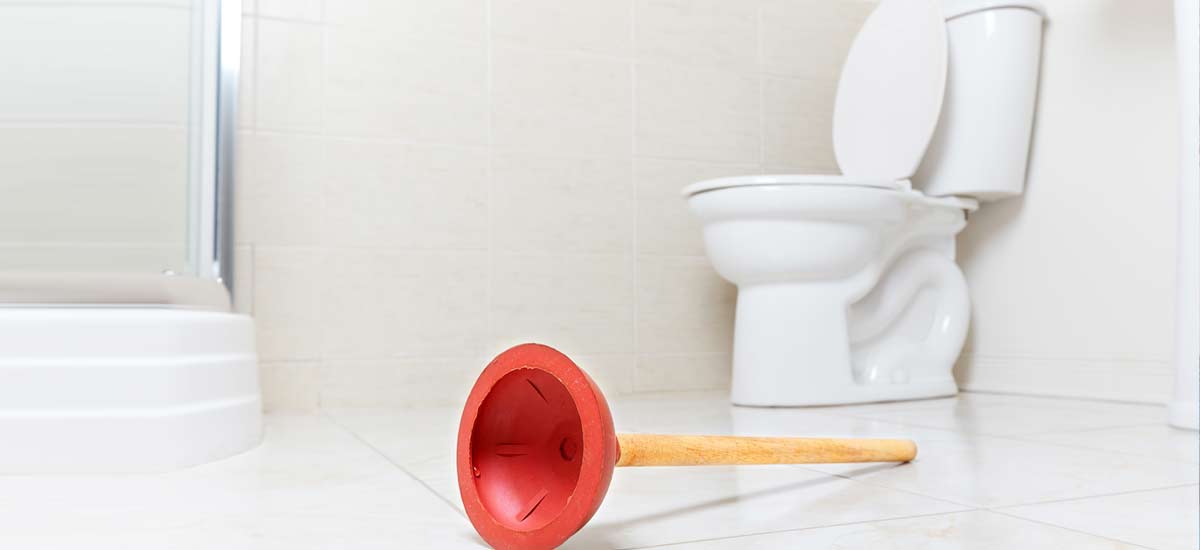
Plumbing 101 by Gallegos Plumbing
Even for DIY savvy homeowners, diagnosing and fixing plumbing issues around the house can be a daunting task.
However, the truth is that there are secrets to every trade, and plumbing is no exception. The experienced plumbers at Gallegos Plumbing have compiled a list of ten secrets about your home’s plumbing your plumber isn’t telling you.
Our ‘tricks of the trade’ might end up saving you a lot of time, money, and frustration.
Table of Contents
- 10 Plumbing Secrets Everyone Needs to Know
- 1. Locate Your Main Water Shutoff Valve.
- 2. Know Where Your Pipes Are
- 3. Burst Washing Machine Hoses Are a Top Homeowner Insurance Claim
- 4. Find Out What’s Flushable.
- 5. No Bricks In The Toilet Tank
- 6. Bring out the Vacuum Cleaner
- 7. Don’t Pour Grease Down The Drain.
- 8. Unexplained Water Bill Rise?
- 9. Avoid Over-Tightening Valves and Tube Fittings
- 10. Plumber’s Tape, The Most Trusted Secret Weapon of Plumbers
10 Plumbing Secrets Everyone Needs to Know
1. Locate Your Main Water Shutoff Valve.
Every homeowner should know about the location of their main water shut-off valve.
While some houses have the main water shut-off valve in the basement or in a utility area within the house, you can find the valve near the front foundation wall in most houses.
The main water shut-off valve controls water flow into a house, so knowing how to shut it off by turning the handle clockwise might help you avert a plumbing catastrophe should an emergency occur.
2. Know Where Your Pipes Are
Planning to drill some screws to anchor your bookcase to the wall? Puncturing a gas pipe, electrical wire, or water pipe could lead to disaster.
So, do you locate pipes and wires behind walls? Stud finders are inexpensive and get the job done.
Is it urgent, and you don’t have a stud finder? Slowly and carefully drill a small hole just through the wall, not past it. You can then probe the hole with a small wire.

3. Burst Washing Machine Hoses Are a Top Homeowner Insurance Claim
Are you still using the rubber hoses that came with your washing machine? You must replace these hoses every three to five years to avoid flooding your laundry room or worse.
Better yet, get rid of them immediately and replace them with stainless steel ones. Stainless steel hoses have a much lower failure rate than rubber hoses.
4. Find Out What’s Flushable.
One of the most common problems plumbers get called in to handle are clogged toilets.
The best way to avoid a clog is to make sure everyone at home knows what can and what can’t go down the toilet bowl. Essentially, anything other than toilet paper can lead to a messy clog. Even “flushable” baby wipes can come back to haunt you later.

5. No Bricks In The Toilet Tank
Some people claim that bricks in your toilet tank can help save water. Don’t be those people.
Bricks in the toilet tank keep your toilet from flushing correctly. There’s a reason why toilet tanks aren’t made smaller in the first place.
Also, steer clear from chemical drain cleaners. They are abrasive and can corrode the drains. Instead, get a high-quality plunger.
Also Read: How to Fix A Clogged Toilet
6. Bring out the Vacuum Cleaner
Whenever you hear the word clog, you probably think of plungers. However, a wet/dry vacuum cleaner is more effective at clearing clogs caused by small, hard objects such as children’s toys.
Quick tip! Keep the toilet lid closed. Many clogs happen when an item falls off the toilet tank’s lid into the bowl when the lid is open.
7. Don’t Pour Grease Down The Drain.
Never flush bacon grease down the kitchen drain.
That liquid grease can turn rock solid and clog your sink. Removing the fat will require the help of a professional plumbing contractor, which means a dent in your wallet.
So, how do you deal with the grease? Wipe the grease off your pan with paper towels, then compost them.
Also Read: How to Unclog a Bathroom Sink, Shower and Drain
8. Unexplained Water Bill Rise?
The sound of dripping water is common in many homes, so a few drips here and there don’t bother you, right? Costly home damage can arise from leaking taps and pipes.
Even minor leaks can lead to substantial damage over time. A dripping tap can lead to unpleasant odors, mold problems, and rotting floors, walls, and ceilings.
Always get leaks fixed immediately you discover them to avoid damaging your home’s construction materials and expensive water bills.
9. Avoid Over-Tightening Valves and Tube Fittings
Tightening of valves and tube fittings is essential in plumbing. Therefore, it shouldn’t come as a shock that over-tightening is one of the most common mistakes DIY plumbers make. All this is due to the simple misconception that a super-tight connection holds better.
So, how do you turn a wrench like a pro, avoiding damage to your fixtures?
‘Hand Tight is Right’ – Turn your plumbing fitting until you feel it tighten, then stop!
10. Plumber’s Tape, The Most Trusted Secret Weapon of Plumbers
Also known as Teflon tape, the plumber’s tape is a toolbox staple that helps you achieve a watertight seal on threaded pipe joints.
Always wrap plumber’s tape three times around the pipe threads before making a connection. It helps you to avoid over-tightening, too!
Wrapping Up
While our tips might come in handy for DIY enthusiasts, don’t always try to DIY. You should know when to enlist the help of a professional plumber to avoid causing even more damage.
Look up “Good Plumber near me in Ventura County,” and Gallegos Plumbing should be at the top of the list.
Call us at (805) 243-2622, or contact plumbing experts at Gallegos Plumbing to fix whatever plumbing issues you have.

